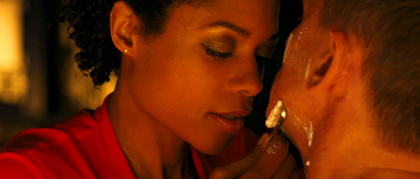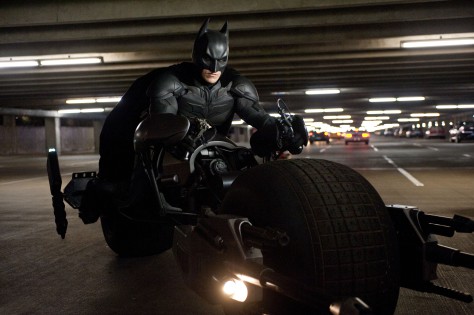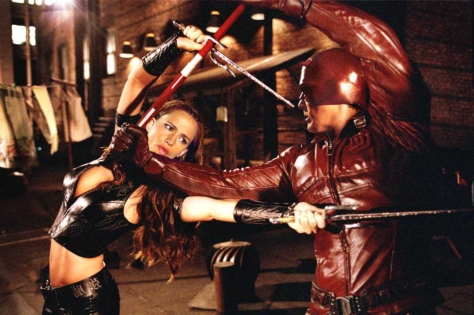
by Russ Schwartz
The message reads, “Think on your sins.” Then MI6 blows up.
The institution is archaic and corrupt, and must be overthrown, says the villain of Skyfall. Yet it wasn’t long ago that the Bond series blew up its own foundations – twice in recent memory. Reinvention, rather than innovation, is the 007 series’ lifeblood, as on each go-round it renounces its formula only to cannibalize it, and then renounces the cannibalization, and so forth. On occasion, it will think on its sins, but not all of them.
Everyone thought it was pretty cool when Daniel Craig, his first time out, said he didn’t give a damn how his martini was made. A decade later, he accepts his perfectly shaken martini, presented to him by the same off-screen angel who throws Indy his hat at the end of Last Crusade. Within the Craig-era Bonds, we’ve seen the agent grow from a parkour ‘n’ poker thug into an assassin who says “England” before the profiler finishes the word “country.”
If Bond has grown into his role within three pictures – enough so for them to re-introduce series staples Moneypenny and Q – what is the next phase of his evolution? None of the other Bonds ever got further: not Connery, who at last wearied of the schtick; nor Moore, who leeringly failed to; nor Brosnan, whose final outing, Die Another Day, was a comic mishmash of everything Bond, a narcissistic, nearly apocalyptic celebration of the series’ continued existence (its momentary bid for relevance being that it pissed off North Korea, in lieu of having Brosnan take on Osama bin Laden).

Until now, though, Bond hasn’t been about evolution, but reboot itself. And so if the current set of handlers, which will again include director Sam Mendes, continue to pursue evolution, eventually they will also pursue death. I have a funny feeling that it will take them two more movies: one to cap the overwhelming success of Skyfall (and maybe pick up the plotline about the Quantum organization), and one to say goodbye. Any change that happens to Bond the man kills 007, and 007 needs to outlive Bond; the way must be open for a fresh reboot.
There are seven movies across the last two Bond runs, and more than half of them – Goldeneye, Die Another Day, Casino Royale, and Skyfall – are principally concerned with the institution of Bond itself. Two of these are reinventions, and two are celebrations. In all cases, little occurs that is not designed to show how the old Bond is new, or how very Bond the proceedings are. The franchise is its own subtext.
You can see a similar pattern in any of Hollywood’s dozens of remakes, reboots, and popular adaptations on offer every year. While the source material varies widely, the filmmakers tend to have the same mix of priorities:
1) To reward the filmgoer for recognizing the characters.
2) To briefly convince the filmgoer that something is changing.
3) To reward the filmgoer for recognizing the brand.
This last one is particularly important here, as the series’ primary concern is finding new ways to configure the Bond brand. That sounds cynical, but I don’t dislike this element. I enjoy being in on the joke when Craig balks at the gun-and-radio toolkit provided by Ben Whishaw’s Q (namely, that Craig’s forebears all received extravagant gizmos to destroy). I remember being 10 and knowing that Super Mario Bros. was a terrible, terrible film, but still not wanting it to end because it had Mario and Luigi in it. (That was not an easy admission to make.) In the Bond series, nearly every moment, every scene, every line of dialogue strives to gratify in this way, even (especially?) in the strongest entries.
Is this self-involvement – a charge usually leveled at Bond himself – the series’ own sin on which to think? Hardly. If writers Neal Purvis, Robert Wade, and John Logan are making a statement, it’s that they will not brook betrayal of all things Bond. Old ways will stay the best ways, and James Bond Will Return. But in affirming this, they commit to committing another sin, perhaps in perpetuity.

Was Pierce Brosnan’s debut in GoldenEye all that long ago? Yes, yes, I know that Spider-Man was back at square one after just a decade, but in Bond years, 1995 is a bat of an eyelash. Part of the campaign to kick the series back into gear for the post-Cold War era involved lip service to the notion that the series was with the times, even if Bond was behind them: the film introduced the first female M (Dame Judi Dench), who in short order took Bond to task for being a chauvinist pig. Of course, that’s the same film that introduced the Russian leg-strangling sex killer Xenia Onatopp, so perhaps M’s own handlers – Eon Productions and director Martin Campbell – were not-so-subtly informing us that Bond is only as behind the times as the films themselves (or that the times aren’t what they think they are, or that Bond simply doesn’t care what the times are).
And that’s where the reboot cycle comes in. Skyfall is meant to refine the Bond formula, and one of its core tactics is to reduce all female characters. It’s a decision, as opposed to a by-product, an oversight, or some other term people use to excuse misogyny. This is the most polished Bond movie ever made, sporting a rock-solid story structure (admittedly cribbed from The Dark Knight), the lush, opulent visuals of cinematographer Roger Deakins, gripping action set pieces, and near-perfect pacing, all in the service of a crusade to refine Bond like a good whiskey; Bond’s country is England, and Skyfall‘s country is Bond. It takes Bond to interesting places, dares us to think he’s slipping, and even manages a strong third act, a rarity for the series. Yet all this careful planning reserves only degradation, dismissal and sadism for the film’s female characters.

Bond is deft enough to sneak onto a boat in Macau and make love to Severine in the shower (because hey, she’s already a lifelong sex slave), but he neglects to sneak off the same way. He casually presents himself to Silva’s thugs, dooming her to die in a shooting competition: Bond aims for the whiskey glass balanced on her head, and Silva (who has seen Bond’s wavering marksmanship scores) simply aims for Severine. Bond’s next line, “Waste of good Scotch,” is meant to throw Silva off, but it’s also the only epitaph Severine gets.
Moneypenny (Naomie Harris) accidentally shoots Bond in the intro, but the act is nearly a term of endearment between them by the end, as they leverage her incompetence – spurred by M’s impatience – into a bit of aggressive foreplay. Perhaps he is allowing her to redeem herself when he hands over his “cutthroat razor” and lets her shave him (good job, darling). But at the end, her flaws in service prompt her to withdraw from field work, deferring to Bond’s paternal suggestion that it “isn’t for everyone.” A scene later, he watches her happily recline to her desk, submissive, the point of entry to the now-male-again M, her sniper rifle removed for good. Not that Moneypenny is new to sexual humiliation (the Brosnan films were progressively meaner to actress Samantha Bond, culminating in her virtual-reality sexual fantasy in Die Another Day), but in the Craig canon, she is a woman who learned her place.

Now, I can think of a few other ways this could have gone. How about having Moneypenny redeem her initial error by helping out in the big fucking shootout with Silva’s guys in London, and getting rewarded with a job closer to M? Heck, if the team absolutely needed to cover all their bases, they could have had her wounded in the process, so she could say something like, “This will do while I’m on the mend.” Q gets to be a hacker now – why not adapt the role of Moneypenny to an intelligence position worthy of the M office? Perhaps this is in store moving forward, but after Skyfall, she is not off to a good start.
Again, these were not accidents in the writing. The movie is concerned with Bond losing his mojo and re-empowering himself, and for him to succeed, women must fail, it seems. All of them do, even M, whose sins (on which she and we are meant to think) are the root of the film. Yes, she can defend why she betrayed Silva, but the film still forces her to pay with degradation, punishment, and death. (A note: When she dies, does it mean Bond has failed her, or that she has paid the price for her ruthlessness? Or has Bond failed to save her from paying the price for her ruthlessness? I must consider.)

Already mortally wounded, M is threatened with death at Silva’s whim, in a sequence as charged as Severine’s murder is dispassionate. It is the film’s most intimate violence, and in this it threatens to break the Bond world. Silva presses the pistol into her hand and begs her to kill them both with one bullet, suggesting an eerie death-rape only prevented by Bond’s well-aimed throwing knife. She dies peacefully in Bond’s arms, her last words harshly praising a job well done.
M’s fate rankles me a bit less than those of Severine and Moneypenny because she’s given space to develop and resolve her character in a film that explores her relationship with Bond as boss/mentor/mother. Facing public humiliation in a government hearing, the defense she presents for her work also serves as a defense of the series (with shades of Gary Oldman’s concluding speech in The Dark Knight – and for the record, I think Skyfall‘s version plays better).
Yet I am still confronted by the fact that all three female characters are ultimately forced to submit, in one way or another, and that this defines the role of women in an entry meant to set the series’ priorities in stone. Back to basics, it says; old ways are the best ways.










